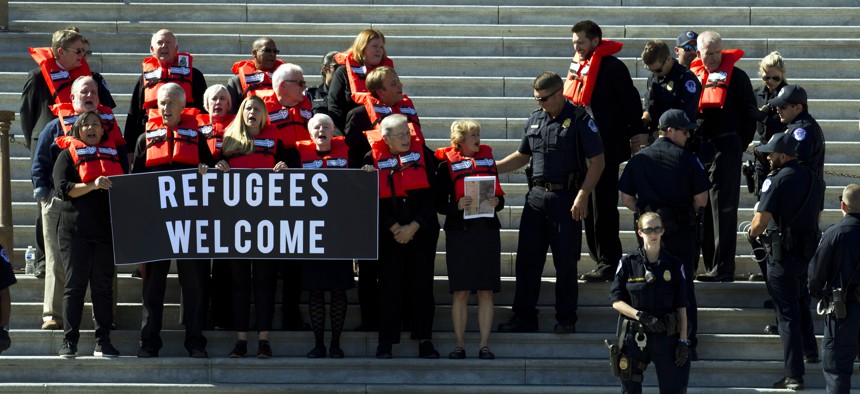Federal Judge Blocks State, Local Veto Power Over Refugee Resettlement

In this Oct. 15, 2019 file photo, faith leaders and members of human rights groups wearing a life vests symbolizing the life-saving program are arrested during a protest calling congress not to end refugee resettlement program. AP Photo/Jose Luis Magana)

Connecting state and local government leaders
A federal judge has blocked the Trump administration from enforcing an executive order that would allow state and local governments to block the resettlement of refugees within their borders.
A federal judge on Wednesday ruled that state and local governments cannot exercise veto power over refugee resettlement in their jurisdictions, putting an executive order from the Trump administration on hold.
U.S. District Court Judge Peter Messitte sidelined President Trump’s order just days before the Jan. 21 deadline by which state and local governments were asked to provide written consent to refugee resettlement for the coming fiscal year.
“Lest there be any doubt, giving States and Local Governments the power to consent to the resettlement of refugees—which is to say veto power to determine whether refugees will be received in their midst—flies in the face of clear Congressional intent,” the judge wrote in a 31-page opinion.
Texas last week became the first state to say it would not participate in the refugee resettlement program in the coming fiscal year. In a letter to the State Department, Gov. Greg Abbott wrote that Texas already has to “deal with disproportionate migration issues” and that the state would rather focus resources on immigrants already residing in the state.
At least 42 other states and 100 local jurisdictions have provided the necessary written consent to allow resettlement agencies to place refugees in their boundaries when they first come to the United States, according to the Lutheran Immigration and Refugee Services (LIRS), one of the resettlement agencies challenging the executive order.
The judge, who was appointed to the U.S. District Court for the District of Maryland by President Bill Clinton, granted a temporary injunction that prevents the Trump administration from enforcing the executive order while the case is heard.
The Trump administration issued the order in September, arguing that it would give state and local leaders more say in the placement of refugees. The order notes that these government officials have not always felt adequately consulted about their ability to handle or prepare for incoming refugee resettlements and it directs federal authorities to enhance the level of consultation that takes place before refugee placements.
Federal law on refugee resettlement provides that there will be consultation between resettlement agencies and state and local governments. But under the Trump order “appears to undermine this arrangement,” Judge Messitte wrote.
“As to States or Local Governments that refuse to give written consents, there will be no consultation, no meetings with the Resettlement Agencies, not just ‘recommendations,” he wrote. “If they do not consent —apparently for any reason or for no reason—there will be no resettlement in that entire State or in that local community. Resettlement agencies will be totally sidelined. In other words, as the screens in e-sports inevitably register: ‘Game Over.’”
The Justice Department declined to comment on any next steps regarding the case.
The injunction provides “critical relief” to refugees who have been waiting to join friends and family in the United States, said Krish O’Mara Vignarajah, president and CEO of LIRS, one of three resettlement agencies that challenged the order.
“We have been successfully collaborating with communities and federal, state, and local governments for decades, and this ruling allows us to seamlessly continue that life-saving work,” Vignarajah said.
As the Trump administration sought to give local authorities more control over refugee placement, it has also slashed the number of people allowed in the United States. For 2020, the State Department capped the number of refugees admitted to the United States at 18,000 people, the lowest level in decades.
The harm the administration’s order would cause both refugees and the resettlement agencies that assist them appeared evident, Messitte wrote in his opinion.
In states that do not provide consent, the resettlement agencies will likely have to cut staff or shut down operations. Meanwhile, they would also have to scramble to obtain written consent to continue resettlement in areas of the country that have not submitted the necessary documents, the judge wrote.
On the other hand, there is “no imminent harm to the Government if it is simply required to keep on doing what it has been doing for decades,” he said.
Andrea Noble is a staff correspondent with Route Fifty.
NEXT STORY: Florida Lawmakers Want to Prohibit Jail Sentences for Missed Jury Duty




